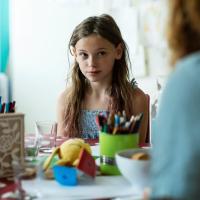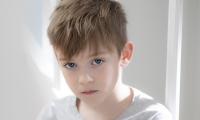How to talk to children about the war in Ukraine
Amid the current and unavoidable confusion of information, misinformation, worried adult looks, and violent pictures are our children. If you need to talk to children about the situation in Ukraine, Tina Mastrup from Psykiatrifonden provides five pieces of good advice on how to approach the conversation.

It is only natural that our children are frightened, or at least concerned about the daily flow of information about Ukraine. And it is difficult to shield children in a world with constant cascades of news and images. In the past week, the scale of war-related news has been much more significant and the majority severe and overwhelming.
The impressions may affect children differently, but if you want to talk with them in a way that provides the knowledge they ask for and generate some peace of mind, then Tina Mastrup from Psykiatrifonden, who runs our children support groups, has five pieces of advice: Listen, give short and precise answers, be honest, create a safe space, and give them breaks.
Listen
Tina Mastrup has worked with children for many years and a critical piece of advice to those who talk to children, not only about war but in general, is to take their worries seriously and listen to them.
“Listen to what they have to say and what they ask. Answer to the best of your abilities. And try answering only what they ask, and nothing more than that,” says Tina Mastrup.
The media currently reports intensively on mothers and children on the run and fathers and brothers who have to stay behind. These are some of the stories that may impact children strongly.
“It is a terrible situation, people are scared, worried, and sad, and many want to help. We can easily talk to children about these things. However, it is also important to let the children know that it is the grown-ups who disagree and that the children will be looked after despite this fact,” says Tina Mastrup.
Keep your answers short and precise
As previously mentioned, it is essential to listen to what the child is explicitly asking, and it is equally important to give a concise and straightforward answer. Use the child’s age as a guiding principle: the younger the child, the simpler the answer.
“And if the child asks for more details, try not to give in. Instead, try to explain that it is something for the adults to worry about. Tell them that no one wants the war to continue,” says Tina Mastrup.
Be honest
Few of us are experts in modern warfare, and those who are will probably be careful not to share this knowledge with children. On the other hand, most of us pay attention to the news to some extent and have a basic understanding of what the war is about: Some grown-ups are disagreeing about who should be in charge of Ukraine. And that is plenty of information for children.
“Be honest if the children ask about something you do not know. No one can know everything, and most children understand that” says Tina Mastrup and suggests watching DR’s Ultra Nyt (Danish news broadcast targeted at children) together if the child is interested in it and has a suitable age. “This way, the state of war is explained on the children’s terms,” she clarifies.
Create a sense of security
Most of the children’s questions arise from their compassion and ability to identify with the victims. They connect what they see to their own lives and may consider how it would be if they were the ones who had to fall asleep to the sound of air raid warnings or were forced to flee. Therefore, it is important to create a sense of security for the children – a safe space.
“Create peace of mind with your answers. Say that it is something the adults will take care of. If the child is very scared and distressed, acknowledge that the situation is, in fact, very serious, but that you will take care of them and that there will be someone to take care of the children in Ukraine, too. It is also crucial to repeatedly tell the children that nothing indicates the war will come to Denmark and that everybody is trying to make it end as soon as possible,” says Tina Mastrup.
Remember to have breaks
It is only natural that both children and adults respond to the current situation in Ukraine, just as it is natural to be scared. Therefore, it is essential to remember to have breaks, says Tina Mastrup.
“It applies to both children and adults. If we constantly follow the news and social media for updates on Ukraine, it will take up too much space. It is important to occupy yourself with something completely different every once in a while and do something fun and enjoyable. Children receive all sorts of information and misinformation from various sources, and it may be difficult to figure out exactly what these sources contain. So: Assist your children in taking breaks,” says Tina Mastrup.
Psykiatrifonden’s advisers are ready to help if you need advice on how to talk to children about the war or if you need someone to talk to yourself. Rådgivningen (our helpline) is open every day, all year round, on telephone: +45 39 25 25 25 and via chat or e-mail. It is completely anonymous and free of charge, and all advisers have a relevant professional background, most often within healthcare.



